
One question most writers are asked is how – or if - they plan a novel. Do they just start banging away on the keyboard, with no idea of where the story will take them? Or do they plot everything meticulously beforehand, so that the ending is already set in stone before they begin? I envy anyone who can answer with confidence one way or the other. My approach is usually to try to map out as much as I can, while resigning myself to the fact that books, like life, never go according to plan.
My main character, David Hunter, is a forensic anthropologist – a specialist in understanding decomposition and damage to bone. As a police consultant, he’s called in to help when badly decomposed, burned or otherwise degraded human remains have been found. Unfortunately, I’m not a specialist myself. I’m a writer and former journalist who’d never even heard of forensic anthropology until I visited the Body Farm in Tennessee, a world-renowned research facility where human cadavers are used to study decomposition.
But that’s another story. The fact is, in order for Hunter to be convincing as an expert in his field, I rely on people who actually are. The questions I ask them are often frankly suspicious: what happens when a body is wrapped in a plastic sheet? How can you tell if human remains have been moved after death? Their help is invaluable, clothing sometimes extreme fictional events in real science. And the course a story takes can depend on their answers.
In my latest novel, The Scent of Death, Hunter is brought in when a partially mummified body is found in the loft of an abandoned hospital. All well and good in theory, until I found that natural mummification is a rare and complex process that only takes place under certain conditions. And because it preserves a body, it’s also incredibly hard to determine how long ago a mummified individual might have died. Which not only made Hunter’s job more difficult, but mine as well.
The real-life specialists who are good enough to supply me with this sort of esoteric but vital information seem to relish being presented with an unusual scenario. For an author, though, it’s a mixed blessing. Creating an original storyline for a book is never easy, so coming up with a challenging idea is no bad thing. Unless, of course, it’s so challenging that it threatens to derail the entire narrative.
That’s where flexibility comes in handy. If everything is rigidly plotted out in advance, it can bring things slamming to a halt when some crucial piece of forensics doesn’t conform to the plan. I know, because I’ve had it happen to me. But while I can’t pretend to enjoy having to rethink some cherished plot element, I’ve learned that it can work to the story’s advantage. As tempting as easy solutions are, letting the book head off in unexpected directions can make it stronger and more unpredictable.
Sometimes this has a knock-on effect on other aspects of the story. I treat the individual novels in the Hunter series as standalones, wanting new readers to be able to pick up and start with any of them. That’s one reason they all take place in different locations - generally some isolated rural backwater where human remains have been discovered. So the setting is very important, not only for creating tone and atmosphere, but because it has a direct influence on both plot and characters.
For The Scent of Death, since the mummification scenario demanded specific environmental conditions, that straightaway narrowed down my options as to where the book could be set. But I’d been wanting to drop Hunter into a more urban investigation anyway, to surround him with a man-made landscape rather than a natural one. A boarded-up old hospital, with all the potential for atmosphere and suspense that brought with it, ticked all the right boxes.
Even then, I had to hastily revise some plot details as the story developed. Without giving away any spoilers, the victim’s clothing, posture and even physical condition all underwent substantial changes over the course of the first few drafts. Each of which required another round of research and emailed questions before I felt the right balance of forensic accuracy and dramatic potential had been struck.
Because that’s the other thing to bear in mind - the main thing, in fact. You’re telling a story that’s meant to be compelling and entertaining, about characters who have to act and sound real, and whose motivations need to appear relatable and realistic. Any research, whether it’s about forensics or what species of bat might be found in a hospital loft, has to support that rather than overwhelm it. The aim is to draw the reader in from the first page and keep them engrossed and guessing until the last.
And if you can pull that off, then who cares if it didn’t go according to plan?

The Scent of Death: (David Hunter 6) Hardcover, Bantam Press – 18 Apr 2019